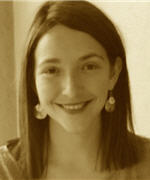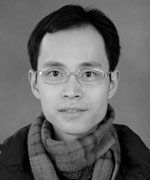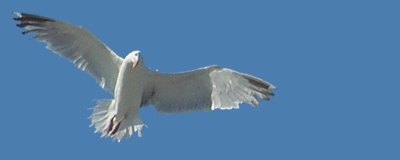
Nomi Stone
罗米-斯通
  Nomi Stone's second collection of poems, Kill Class is forthcoming from Tupelo Press in 2018. She is also the author of the poetry collection Stranger's Notebook (TriQuarterly, 2008), a Postdoctoral Research Fellow in Anthropology at Princeton University, and an MFA Candidate in Poetry at Warren Wilson College. Poems appear recently in The New Republic, The Best American Poetry 2016, Poetry Northwest, Sixth Finch, diode, and elsewhere. Nomi Stone's second collection of poems, Kill Class is forthcoming from Tupelo Press in 2018. She is also the author of the poetry collection Stranger's Notebook (TriQuarterly, 2008), a Postdoctoral Research Fellow in Anthropology at Princeton University, and an MFA Candidate in Poetry at Warren Wilson College. Poems appear recently in The New Republic, The Best American Poetry 2016, Poetry Northwest, Sixth Finch, diode, and elsewhere.
罗米-斯通的第一本诗集为《陌生人笔记》(2008),第二本诗集《消灭阶级》将于2018年由图珀洛出版社出版。她目前为美国普林斯顿大学人类学博士后,获华伦-威尔逊学院创作硕士,她的作品刊登于《新共和》《美国2016最佳诗选》《西北诗歌》《第六只雀》《二极管》等美国诗刊。
|

|

译者
Translator
冯冬
Peter Feng
  冯冬,现居青岛,2011年从南京大学英语系获博士学位,致力于诗、哲学、精神分析的共通,译过多位美国诗人,包括司各特-琼斯诗集《别处》、《未来是一只灰色海鸥:西尔维娅-普拉斯诗全集》(上海译文出版社)。其对诗之本质陌异性的关注凝结成三本诗集:《平行舌头》、《沙漠泳者》、《残酷的乌鸦》(与孙冬合著,南京大学出版社)。原创作品刊于《诗天空》《美国诗歌评论》等海内外诗刊。 冯冬,现居青岛,2011年从南京大学英语系获博士学位,致力于诗、哲学、精神分析的共通,译过多位美国诗人,包括司各特-琼斯诗集《别处》、《未来是一只灰色海鸥:西尔维娅-普拉斯诗全集》(上海译文出版社)。其对诗之本质陌异性的关注凝结成三本诗集:《平行舌头》、《沙漠泳者》、《残酷的乌鸦》(与孙冬合著,南京大学出版社)。原创作品刊于《诗天空》《美国诗歌评论》等海内外诗刊。
Peter Feng is a poet and translator from Qingdao, China. He received a PhD in English Literature from Nanjing University in 2011, and since then he has been exploring the interconnections between poetry, philosophy, and psychoanalysis. He has translated a number of American poets, including elsewhere by Scott Alexander Jones and The Collected Poems of Sylvia Plath (Shanghai Translation Publishing House). He is the author of Parallel Tongues, The Desert Swimmer, and Cruel Raven (co-authored with Sun Dong, Nanjing University Press). His poems appear in Poetry Sky, American Poetry Review, Big Scream, Grey Sparrow, Napalm Health Spa, and others.
|
Nesting, the turtle seems to be crying even though she is simply
secreting her salt. Her dozens bud limbs inside amniotic pillows as she leaves every
egg
in a cup of sand the size of her body, shaped like a tilting teardrop — and both cryings
are mentioned by scientists. My niece Eve is startle-eyed when you feed
her
avocado and when you feed her sweet potato. She lives mouth first: she would eat
the sidewalk and piano, the symmetrical petals of the Bradford pear, as if she could learn
which
parts of the world are made and how, and yesterday she put her mouth on the image of
her own face in the mirror. Larkin says what will survive of us is love, but the scientists
say
that the end of the decay-chain is lead and uranium and after that, plastics. Just now
the zooplankton are swallowing micro pearls of plastic and the sea is aflame with waste
caught
in the moon's light. Here is the darkening hour and here, the shore, as she droplets
her eggs, bright as ping pong balls, into the sand.
She can't
find the spot. The beach is saltined with lights, neoned with spectacular
globes of light, a dozen moons instead of the one
moon.
Still, she lets them go and one month later, tiny turtles hatch. They seem groggy,
carrying their houses of bone and cartilage to the ocean, scrambling toward the horizon
alongside
the earth's magnetic field. Less than one percent of the hatchlings make it past
the seagulls and crabs, so Noah spent a summer dashing them to the water. But my
poem
is not about the moment when a bird dove and bore
into the underflesh and into Noah's memory. My poem is about how we are gathered
around Eve
in the kitchen as she eats a fruit she has never tried before and each newness
in the world stops the world's ending in its tracks.
|
|
归巢后,这只海龟像在哭,虽然
她只是分泌盐。氨基酸枕内,她许多肢体发芽,她将每一个
蛋
放入身体大小的沙杯,如倾斜的泪珠——两种哭泣
都被科学家引用。你喂她鳄梨和甜土豆时,我的侄女夏娃
会睁大眼睛
她以嘴为先,吞下人行道、钢琴、对称的豆梨花,仿佛这样就
认识
世界构成的材料与方式,昨天她一口吞下自己的镜像
拉金说,爱比我们活得更久,科学家
却说
衰灭之链的最后是铅、铀,在那之后,是塑料。此刻浮游动物正吞吃
微小的塑料珍珠,大海点燃于月光照亮的
垃圾物
此处时辰昏暗,她滴落乒乓大小的明亮的蛋
进入沙堆
她回头就找不到地点。
海滩上的灯火如饼干上撒盐,圆形的光,闪耀如霓
十几个月亮,不止
一个。
她撒落它们,一个月后,小海龟孵出,跌跌撞撞
扛着软骨的房屋奔向大海,沿地球磁场的地平线
乱跑
孵化的海龟中,只有不到百分之一的能越过海鸥和螃蟹
所以诺亚用了整个夏天将它们冲入海水。但我的
诗
并不是关于鸟俯冲入肉身与诺亚的记忆。我的诗是关于
我们
如何聚在夏娃身旁。厨房里,她正尝一个从没吃过的果子,每一次新意
都阻挡世界在自身轨道上的终结。
|







